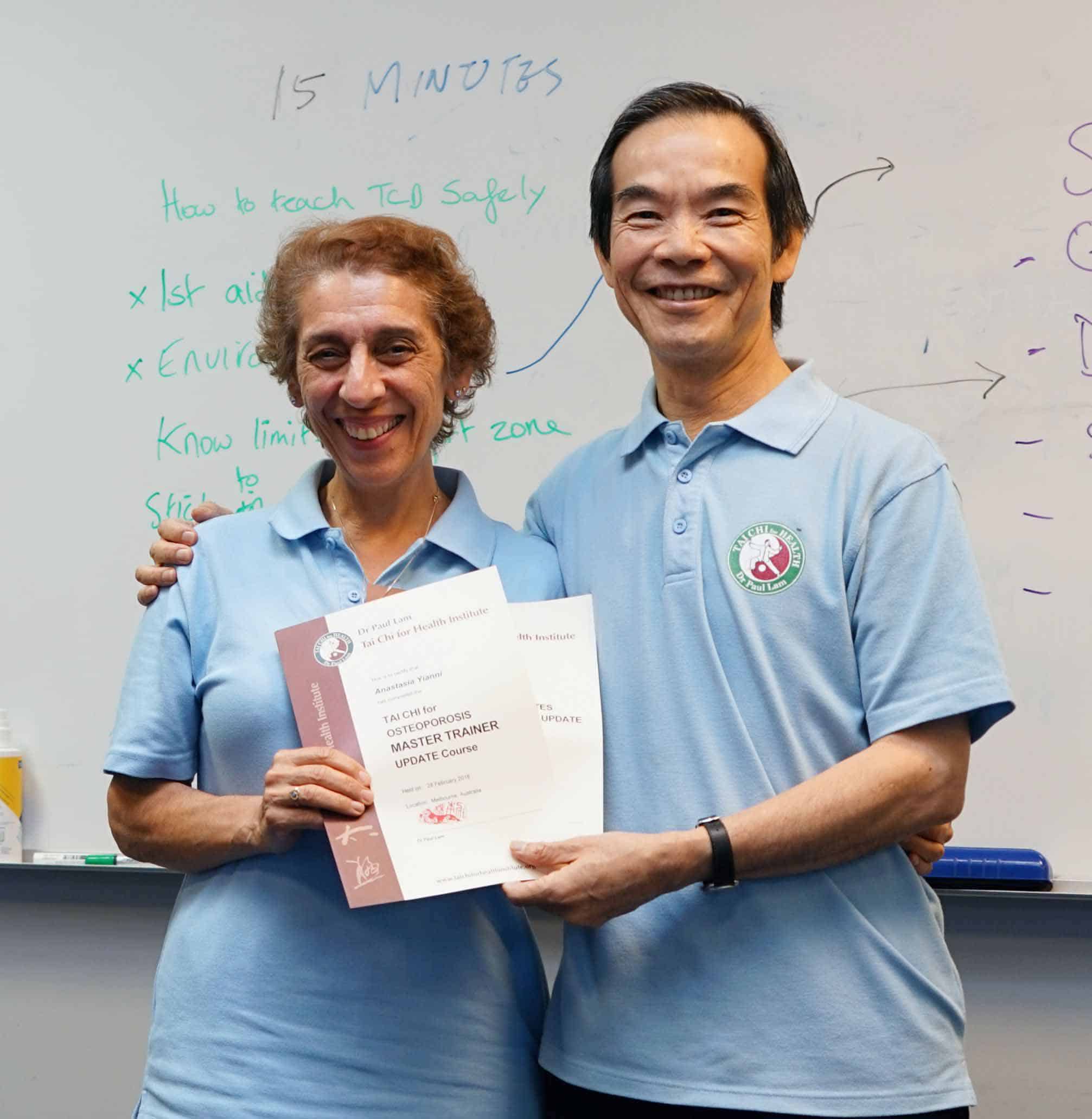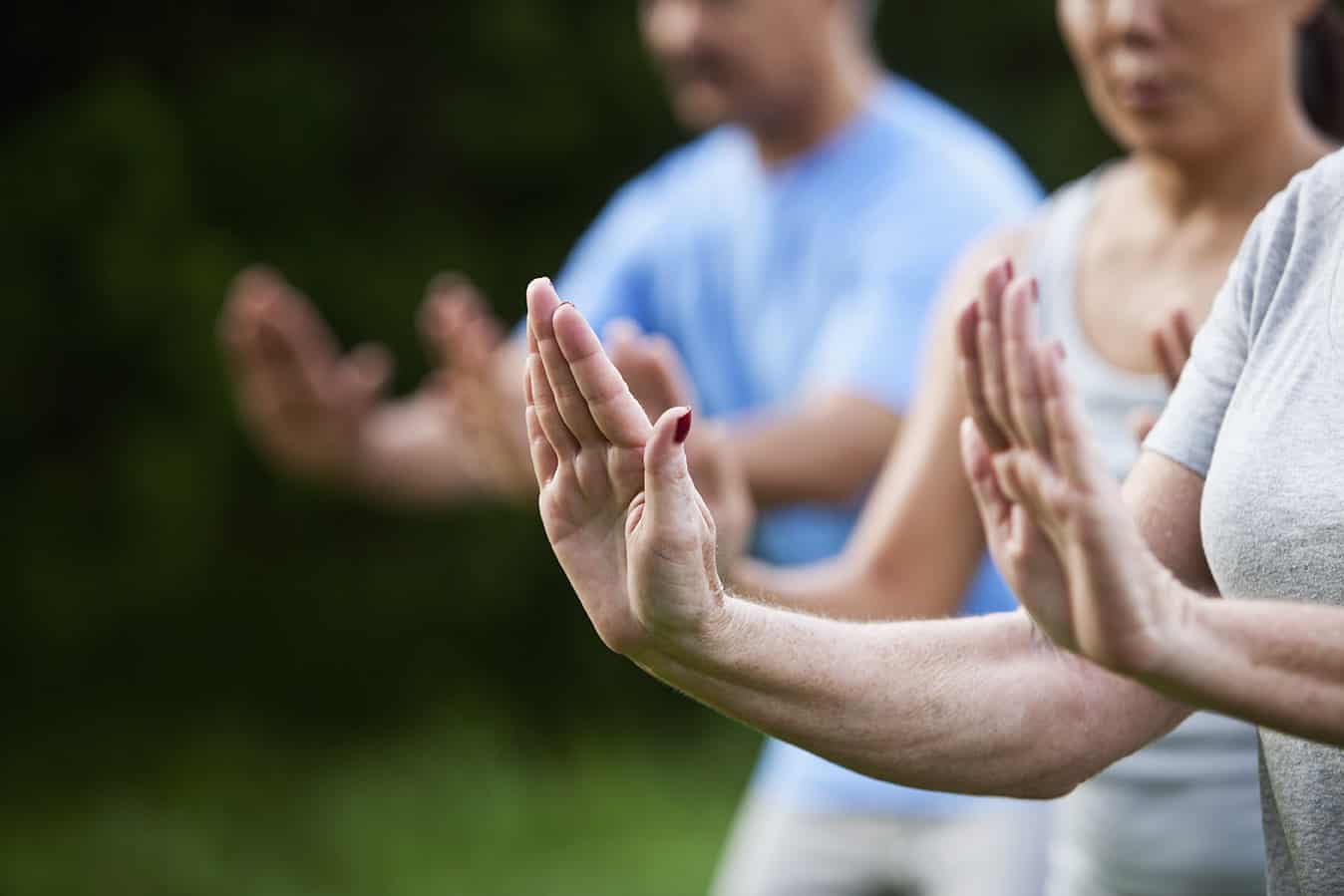Tai chi is ‘movement meditation’ says RN and Master Trainer of the Paul Lam Tai Chi for Health Institute Anastasia Yianni.
“Tai chi is meditation in motion. It is very much to do with the integration of your mind and body; it’s mindfulness.”
Also a mental health nurse, nurse educator, fitness instructor and personal trainer, Anastasia has a strong interest in health promotion for self-empowerment to maintain an optimum level of wellness and independence.
At a friend’s recommendation Anastasia took up tai chi after having moved to Australia from the UK. She was a single parent and started tai chi classes when her son was three. “I started to do tai chi to build up my strength, improve my health and to keep calm. I was a sole parent keeping everything together, feeling anxious and it [tai chi] really helped me. It is a tool for self-empowerment for your own health and wellbeing.”

Anastasia was working at Epworth Rehab in Melbourne where the physiotherapists used to approach her and ask: ‘Will you do some of that stuff you do?’
“It was actually just doing some simple breathing exercises with patients that I had learnt through my tai chi. People had major cardiac surgery and still had some anxiety post-surgery. I guided them through simple movements in tai chi and really saw the benefits; it reduced their anxiety.”
Tai chi is a martial art which originated in ancient China. It is practised now mainly for health benefits, says Anastasia.
“Tai Chi is based on the law of nature and Traditional Chinese Medicine to improve Qi – life energy – for a happy, harmonious state. If you have dents in your Qi you are open to disease. Qi is all about life energy and being in harmony with nature.”
Anastasia has worked as a community health nurse teaching tai chi to people with chronic illness and mental health challenges as well as facilitating staff wellness classes. She runs tai chi and gentle exercise groups for the general community; her classes are endorsed by Parkinson’s Victoria and Musculoskeletal Victoria.
With an extensive background in rehabilitation nursing, Anastasia says tai chi improves health, quality of life and is an intervention for falls prevention.
Evidence shows tai chi as one of the two effective exercises to prevent falls. A NSW Health study of the Dr Paul Lam ‘Tai Chi for Arthritis’ program in 2001, found nearly 70% reduction in recurrent falls by participants.
The Tai Chi for Rehabilitation Program for example, consists of three different tai chi styles. Chen style which is vigorous and sophisticated, with fast and slow movements along with powerful spiral force. Sun style includes unique qigong (life energy) along with agile steps. Yang has graceful and slow movements which promote health.
No matter what form of tai chi, specific tai chi principles are incorporated into tai chi practice, says Anastasia. Some of these principles are:
Movement control
Tai chi movements are slow, smooth and continuous creating a sense of serenity. Mindfulness of the movements help to strengthen internal muscles, like the deep stabilisers that support and strengthen the spine.
Weight transference
During tai chi movements practitioners are mindful of where they transfer their weight, which helps to improve mobility, coordination and balance. There is an emphasis on upright and supple posture which further strengthens muscles.
Integration of mind and body
Tai chi stresses the integration and balance of mind and body. It builds strength from the inside out. You build strength internally then externally. Tai chi is about building up the internal muscles.
Nurses can benefit by incorporating the tai chi principles into their everyday lives, says Anastasia.
“It is something I continue to strive for. On the train for example, I often stand up well before my stop and feel the weight distribution through my feet and pay attention to my posture and sense of balance.
“Sometimes if I let myself feel rushed, I will sit calmly in my car and do Qigong breathing exercises before I drive off. It takes less than a minute with a powerful positive effect. Often in my nursing roles I have gone for a ‘toilet’ break and done the same thing.” https://taichiforhealthinstitute.org/four-qigong-exercises-4/
As an experienced Master Trainer, Anastasia has trained health professionals in the Tai Chi for Health programs. The whole vision for Tai Chi for Health professionals is for it to be accessible to as many people as possible and that means being able to modify it to suit, she says.
“Over the years we are looking more and more at wellness in being vital in caring for our patients. If you see a nurse who is calm and relaxed, it has a ricochet effect on the people he or she is caring for as well.”
“As nurses we do need to walk the talk. We work in such stressful environments we know the therapeutic relationship with those we are caring for has a massive effect. I think as a nurse if you have a calmness and sense of balance in your life and are physically and mentally well, then that helps your patients as well.”
The Tai Chi for Health (TCH) Programs are easy and quick to learn, especially suitable for health professionals. With prior preparation almost all nurses can learn a program like Tai Chi for Rehabilitation in a 2-day workshop. Be ready to teach others and practice for self-health. There are over 30 published studies specifically for TCH programs to show many health benefits, several are done by nurse researchers.
For further details about courses see the link below or contact Anastasia via email.
anastasiataichi@gmail.com








